Pt 5 - David Tennant's Obscure Performances: wrapping up 'Only Human' (2002)
...deets on the new scene, plot points, trivia, and where it might've gone had it aired
This is the final part of a five-part series about Only Human, an unaired BBC pilot made in 2002 and starring David Tennant as Tyler, a private detective who works with a virtual digital assistant called Ada. In this series of posts we’ve been exploring the origins of the pilot and unveiling its hidden history.
And if you’re new to the story we’ve been telling about Only Human, I urge you to stop right now and read Parts One, Two, Three, and Four. Believe me, everything in this article will make a lot more sense if you do!
When we left our story last time, Only Human was done. Finished. Kaput. It had no more stories to tell.
But that’s not quite true. Perhaps those stories don’t exist on screen, yes…but there were still plenty of them to tell. And because Jim McClellan did the work and developed a series bible for the show (and kept it for all these years!) we’re lucky to be able to dip our toes back into the world of Only Human.
We’ll get into McClellan’s larger vision in just a moment. But first, we promised you more details about that new three-minute scene they filmed for the second shoot…and we’re gonna do it with pictures!
In the scene, the role of Ada was played by Clare Buckfield, the third of the three new actresses they chose to replace Ruth Millar. “Anna Wilson-Jones played Sally nicely. It was a low-key scene with some comic potential, which she brings out,” McClellan said. “David was very good, as usual. He dials down his irritation with Ada (as he’s got company) in comparison to the first pilot, but it comes out in his little expressions and a few raised eyebrows here and there.”
When the scene opens, Sally has come round to Tyler’s flat on his invitation for drinks. He’s a bit nervous - in part because he likes her a lot, and in part because his living set up is a bit unconventional (he lives in an old office building, and there are webcams everywhere run by his landlord, Cam).



Ada interrupts Tyler and Sally’s nervous talk - there’s a long pause, so she assumes it’s okay to speak. She offers to play Tyler his messages. Sally says that’s okay. One message is from a fellow named Mars about an unpaid debt. Tyler is embarrassed, but Sally says it’s fine and gets up to have a closer look at Ada. She finds Ada funny and asks Tyler to introduce them properly. He grudgingly does. Sally remarks Ada is better than the assistants at her office and compliments her on her conversational skills by saying she’s better at it than her owner!



Things seem to be okay, but then Ada asks Sally to specify the nature of her relationship to Tyler and to verify some data she has gathered about her for Tyler. Tyler, panicked, tries to get Ada to shut up - to no avail. Sally is understandably a little upset. Tyler suggests he and Sally head upstairs to wait for his landlord Cam, and then has a few cross words with Ada himself.
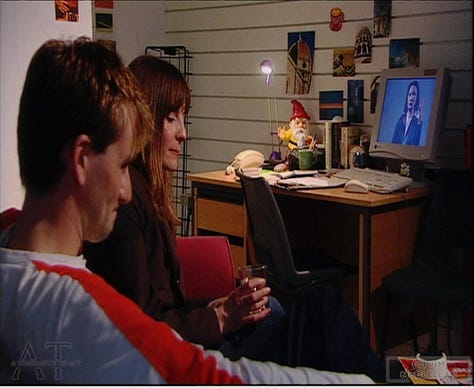


Scenes from 'Drinks With Sally': Ada reveals Tyler's gathered data on Sally by asking Sally to verify it; Sally gets upset; Tyler has words with Ada Annnnnnd….end of scene!
—
Any exploration into the world of Only Human must first acknowledge the existence of two distinct versions: the world depicted in its initial pilot, and the wider world crafted by McClellan and Smith for BBC Scotland's later pilot script. These two worlds meshed more often than not, but even where they clashed there was one constant: what McClellan called “a ‘five minutes into the future’ feeling.” Tyler’s world looked like the present, but it was also subtly different.
In the world of the initial pilot, Tyler was just a private detective. We didn’t really know much about who he was, other than his last name began with a “W” (“TW Investigations!” Ada had chirped when he briefly put her to work as his online receptionist). I asked McClellan whether he’d ever decided what Tyler’s last name was. “Not really. I had to add something, and I thought TW was easy to say. I probably made a note to myself to work out what Tyler’s surname was later on.”
There also wasn’t any explanation as to why Tyler was living in an old office building, and why he didn’t think to wonder why Cam would offer him free rent in exchange for installing webcams in his flat (or why Cam even wanted them there). At the beginning of the pilot, Tyler is talking about a network crashing, which made "changes" in the tech and gave his life “a few added extras”…namely, Ada.
What was that all about, anyway?
“The crash Tyler mentions was a local crash in his building, initiated by Cam so he could install Ada and make some changes to the local network,” McClellan explained. “Tyler’s a little incurious about online things, so he just says the whole net crashed.”
It was an apathy which permeated Tyler’s nature. “I wanted Tyler to be a mix of clever and a bit naive. In his job, he’s professionally skeptical. In his personal life, he can be overly trusting, incurious, unwilling to think too hard about difficult things - and his past - but as the story progresses he has to do that more, in part thanks to Ada.”
McClellan had plans to develop the relationship between Tyler and Cam, though he hadn’t plotted it out in great detail. “I did have plans for us to find out more about him [Cam] and what he’s up to. Basically Cam is Tyler’s landlord - and does send him some investigative work - but he’s also connected to people who are connected to Tyler and interested in him for reasons which become clearer as Season 1 and 2 progress. But for the pilot, my initial idea was that Cam was doing some kind of art project that involved gathering data about how people moved through buildings.”
McClellan’s inspirations for Cam’s agenda? First, there was the dawning of reality TV with the series Big Brother, which had been on in the UK for a couple of series by 2001. Then there was his interest in a project done in New York by a guy called Josh Harris. In 1999, Harris mixed up reality TV and art when he enlisted 150 volunteers to live communally in a bunker housed on three floors of a loft building on Broadway in New York City - with over 100 surveillance cameras capturing their every move.

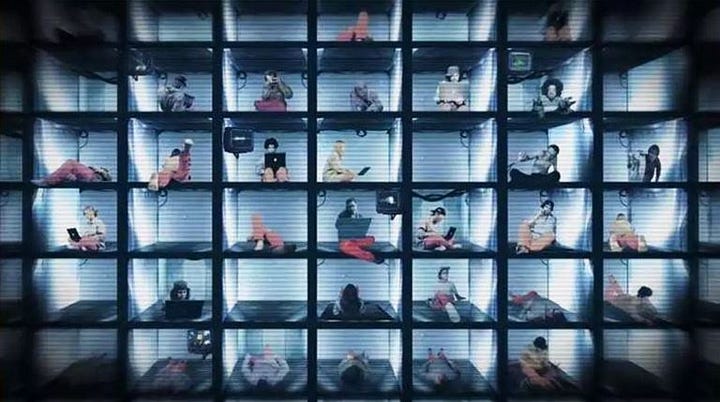
McClellan continues. “More generally, with Tyler’s home I wanted to get the sense that things were different, or a bit off-kilter. Also that boundaries are eroding - Tyler’s home is an office, he’s got cameras tracking him, and, as we would discover later in the series, someone from outside watching him.”
But how? Using Ada! McClellan tells me the story would have keyed in on the dawning realization that, amongst the people who developed Ada, someone is using her to watch Tyler - but other people on the team were more interested in watching Ada than him. That light bulb moment would’ve left large ripples throughout Only Human’s entire run.
Tyler’s private investigator work was the perfect conceit; each episode, another low-level cheating, lying or stealing bad apple would appear to demonstrate how people misunderstood and deceived each other. Doing what he did, it was understandable if Tyler had grown a little jaded. But as Ada’s assistance on his cases slowly helps mold Tyler into a better detective, he develops a sense of who Ada really is…and starts asking himself about her. Was Ada just some dumb thing he’s working with? Where has this person - if it even is a person - come from, and what is really going on here?
Ahhhh…..yes. Ada. The yin to Tyler’s yang.

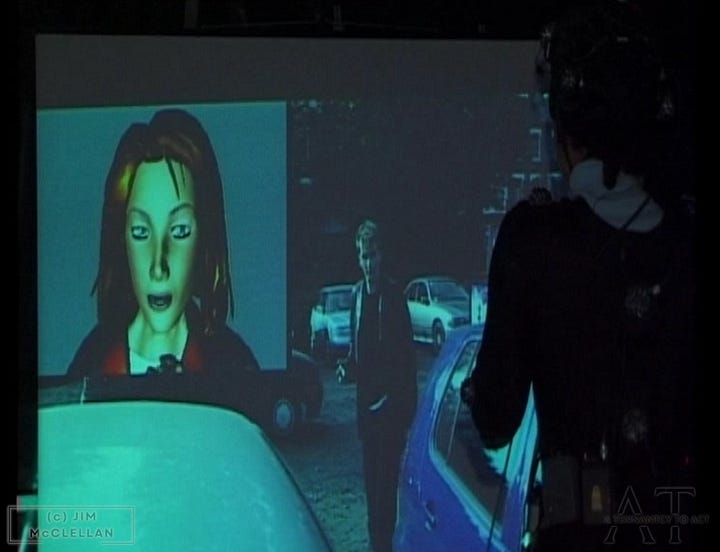
The question of precisely who or what Ada was would butt heads with Tyler’s hard-won skepticism and shape the central push-pull narrative theme of the show. McClellan wanted viewers to ask themselves the same questions Tyler was asking himself. Is she, or isn’t she? When Tyler wondered whether Ada was truly alive or if she was some sort of conscious machine, he wanted the audience to wonder, too. Or was Tyler just projecting something on to her and seeing more than was there? Should he trust her and what he thinks about her, or should he be suspicious?
“I wasn’t sure when we’d get to a definitive answer to that question,” McClellan told me. But he does have a few glimpses into a later season to share with us.
“In the climax of the first series, the plan was for him to finally believe she's real,” McClellan explains. Ada then helps to save Tyler and Sally after the two find themselves in a heap of trouble and are being chased across the city. But things go quickly downhill from there; Ada and Tyler have an argument, and Ada vanishes.
“In the second series, he has to find her, and then, once he does, he tries in a more focused way to find where she came from, and what or who is behind her. You would also find out a bit more why Tyler is such a Luddite, and a little bit about his father, who’s a tech entrepreneur involved in various dodgy things.
“One idea I had, which was very vague,” McClellan reveals, “was that at the end of Series Two or early in Series Three, we would meet a real woman who looked exactly like Ada. There would be a story line about her connection to Ada’s development. The plan, if the show had been commissioned, was to cast Ada (I always hoped it might be Ruth [Millar]), and then create a custom virtual model based on the actress who played her.”
We’ll learn more about Ada in a minute. But there was one other thing McClellan really wanted to let us know: Goldfrapp!
If you’ll recall, Goldfrapp’s song, Human, was the track McClellan picked to use as the opening music to the first pilot. He said the track was perfect in many ways, not just because it had the right sort of sound and feel. He points out its chorus:
Are you human or a dud?
Are you human or do you make it up?
and says, “It felt like it connected with this idea that in the series there would be a lot of people - not just Ada - where we don’t know if they’re human, or making it up, or pretending to be something.”
And one other thing he said: “If the show had been commissioned, it was my fantasy back then that we could have got Goldfrapp to do all the music.”
—
So that’s Only Human’s initial world - the world of 2002, its original pilot. But then the pilot snagged some interest from BBC Scotland later that year and looked like it might become an hour-long show. McClellan and Smith started creating a more detailed and longer-form script…a wider world of Only Human (McClellan also started assembling a series bible and began to think in terms of three series). This was the script they continued to develop into the fall of 2003, when BBC Scotland decided to pass on the project.
McClellan still has a draft copy of that script. It was initially titled ‘Money Talks’, but was later changed to ‘Loser Friendly.’ And as you could probably expect, many things had changed.
I’ll let McClellan supply the details:
The pilot plot we developed is basically a kind of origin story - when did Ada arrive in Tyler’s life and how did he become a private detective. He isn’t a detective at the start of the pilot - he’s drifting around and works on and off as a barman at a bar run by Mars, an old friend who he now owes money to.
Tyler meets Sally when he’s working at the bar. He realizes she’s being conned by her current boyfriend, who, as the story develops, is revealed as a financial con-man ripping off a number of career women via a financial app he’s created which puts them more in touch with their money. Tyler and Sally meet for a drink at the end, after he’s cracked the case with Ada’s help, but Ada then reveals a bit more about his working methods than Tyler might want. which causes Sally to leave…
In the pilot script, the scene with Sally is expanded a little. Sally says to Tyler: “Have you been googling me?” - which back then seemed a bit rude, but now, I guess everyone is used to the idea that people research everything and anyone online all the time.
All of those plot details aren’t there in the new scene we shot on the second shoot, but the basic idea is that Tyler is trying to develop a relationship with Sally, but Ada gets in the way by revealing more about Tyler than he’d want.”
In this draft (and in the series bible McClellan had been assembling in case the pilot was picked up) Sally was going to become an important person in the Only Human world, and not just because she was Tyler’s girlfriend. Her interactions would become plot points throughout the series.
“I was thinking about data and data collection,” McClellan said, “and the fact that if you have enough data about people, you can look like you know the future because you can predict what they do or what they're likely to do. And so in the series bible, Sally works for an advertising agency setup. And one of the main characters there, her boss - his whole thing is gathering as much data about people as possible so he can predict what they might like.” McClellan planned to have Sally play a slightly problematic role in bringing her boss into Tyler’s world - something she would regret and attempt to do something about as the story developed.
McClellan and Smith also developed a number of other incidental characters for the script who might’ve grown into larger roles as the series progressed. One of these was Mars, an old friend of Tyler’s who loaned Tyler money in the past and who owns the bar Tyler’s working at when the script opens. Mars also featured briefly in the drinks with Sally scene in the second shoot; while Ada mentions him in that new scene (he’d been trying to phone Tyler because Tyler owed him money, and Ada screened the call) Mars doesn’t speak or physically appear.
About Mars, McClellan says:
One of the ideas with Mars was that he and Tyler worked together running illegal raves and warehouse parties. Mars was in charge and Tyler was a fixer, someone good at sorting out problems for him on the ground (though not ones requiring muscle). He’s more quick-witted and an innovative thinker.
I wanted the sense they’d been in the fringes of the criminal world and this gave Tyler a sense of how things work there, which helps as he drifts into private detective work.
When Mars decides to go legit, cash out and set up an above-board bar, Tyler feels a bit lost. There’s a sense he and Mars have had a falling out before the show gets started. Tyler’s running away from growing up a bit but Mars realizes you can’t party your whole life…something Tyler’s also starting to realize as the series begins.
Another incidental character whose first appearance was in the draft script and who would’ve almost certainly been elevated to a larger role was Lynch. “Tyler’s dad appears and is called Lynch,” McClellan told me. “In theory, that was his first name. I have a feeling it wasn’t his complete name, though. I had an idea I’d add something to it once I’d worked out the larger narrative arcs, but I don’t think I ever got around to it.”
McClellan had plenty of ideas about Lynch:
One of the general ideas around Tyler’s father is that he works in tech, and that Tyler has grown up in a world dominated by tech with an absent father who used it to compensate for his absence. Hence Tyler’s suspicion of that world - which he runs away from via his immersing himself in the illegal party scene (he kind of goes off grid for years). Lynch is trying to reconnect - but Tyler is suspicious…
One of the ideas for a larger arc would be that, at first, you think Tyler’s dad is one of the villains - but over time, you start to see things are more complicated. Related to this, very briefly the pilot script introduces a kind of super rich tech bro type (as we’d call them now) called The Big Kid (aka BK), who comes to play a more significant role in the storyline over time.
Which brings us back to Ada.
The tech bro McClellan mentions (BK) would have played some part in Tyler’s continued quest to learn more about Ada’s origins. “The focus was always more about who might have developed her initially, and we had an idea Tyler’s father [Lynch] was also going to be connected to this in some way,” McClellan shares. “Sally’s boss also gets involved, due to his desire to gather more data on people.”

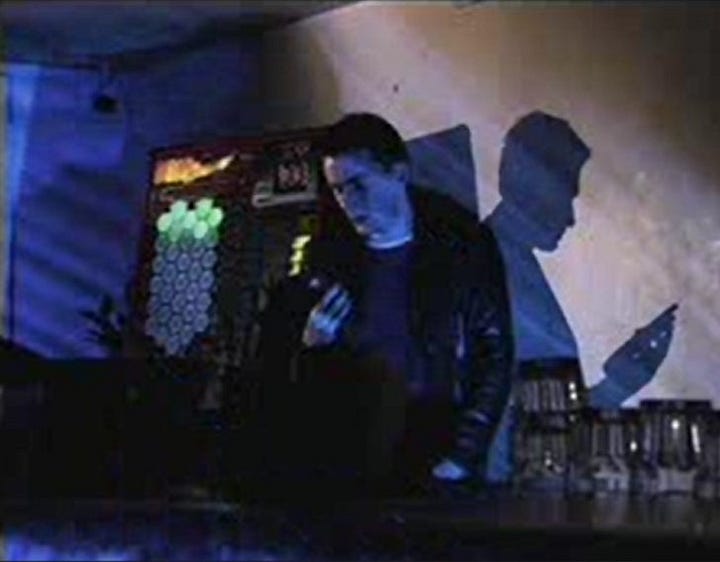
If you recall, Tyler knew Cam had installed Ada on his system but wasn’t very curious past that; in the longer script, Cam has a look at Ada and discovers she’s designed to be self-upgrading - she can learn, and she can absorb other programs she encounters (as a matter of fact, she finds a lot of Cam’s hacking tools when on the network he runs in his building)!
While virtual assistants were around in the world of Only Human, Ada was better, especially after she was let out onto the Internet and allowed to learn and pick up lots of ideas and influences. She’s not the routine, limited sort of “digi-assistant” Sally mentions they used where she works. McClellan says in the world of today, Ada is more comparable to ChatGPT and LLMs (large language models - deep learning models pre-trained on vast amounts of data) than she is to household virtuals like Siri, Alexa or Cortana.
One side of Ada being self-upgrading, McClellan says, was that she was a bit glitchy and unstable. “I wanted to create a situation where, even when you’re convinced she’s ‘alive’, you’re not sure. I also wanted to suggest her glitchiness and unpredictability makes her hard to control or understand - especially for the people who developed her and have malign or problematic intentions.”
If Only Human had been picked up, McClellan reveals, it would have embraced other emerging technologies - including some very different ways to think about Ada.
“BBC Imagineering and Rowena [Goldman] encouraged us not just to think in those three series things, but said the idea was that this would be multi-platform,” McClellan explains. “One of the briefs for Imagineering was to think about how you develop content which could work in different ways, across different platforms. That was quite forward-looking, if you like, because it was 2000. We had the World Wide Web, computer games and CD-ROMs, sure, but if it had gone to series, we were going to create online games involving Ada where people could talk to her. She would add plot lines, or things that would connect to Easter eggs or hidden clues in the show, and take you off in different directions. The viewer could also be responsible for trying to figure out where she came from, who made her, whatever…which would then loop people into later episodes.”
Huh. Only Human might have been a part of some revolutionary things.
—
So where would it all have went? We’ll never know.
McClellan doesn’t even know.
What we know for sure is that Only Human remains an interesting and compelling part of David’s catalogue of work in a career that’s gone from strength to strength to strength. Like the pilot episode Rex Is Not Your Lawyer a decade later, Only Human could’ve changed the trajectory of David’s career - if the powers that be would’ve made other choices. If one timeline had eclipsed another.
As Tyler said:
"Looking back, I suppose you could say it started with a crash. The whole net went down in the middle of yet another ManU regulation battle. Everything went black, so I crashed out, too. And when everything came back online, well...let's just say my life had a few added extras."
There is no doubt about it: one of these extras was Only Human.
—
‘Only Human’ images courtesy of Jim McClellan (c) 2024. A Tennantcy To Act/Patricia Browning. All rights reserved.


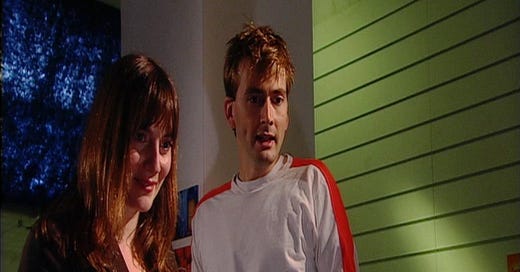


My girl! You have done a masterful piece of work here. As always, I am in awe!
Lovely write up..... and it reminds me of Turn Left... what would have happened if this had been picked up or Rex had been picked up? What choices would DT have passed on that we now love? Hmmmmm